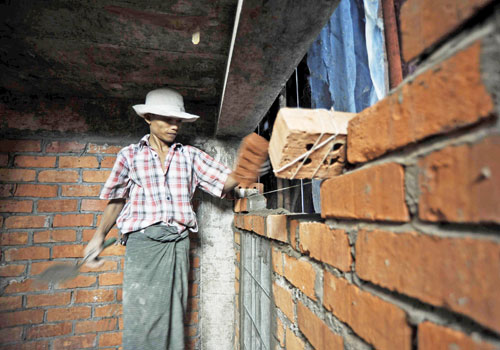 Real estate agents in Yangon say the property market has fallen totally silent over the past week, with almost no deals signed.
Real estate agents in Yangon say the property market has fallen totally silent over the past week, with almost no deals signed.
While sales have continued to slow since the start of the year, there has been no buying and selling whatsoever over the past week, because the November 8 election is drawing near, said agents.
“The property market is currently silent, by which I mean 100 percent. Everywhere, every type of market, big or small, deal volumes are way down,” said U Khin Maung Aye of Shwe Kan Myae real estate agency.
“Property dealers have almost stopped trading, which makes a big impact on the market. Though occasionally people are still selling their properties because they need the money,” he said.
He added that most investors are now waiting for clarity on the new government and its policies.
“The election is very close now – everything can change after that,” he said.
However, other factors beside the election have led to a shortage of deals, said U Thein Hla Nyo, vice chair of the Myanmar Real Estate Services Association (MRESA).
“Election monitoring is one part of it, but other issues such as rising real estate taxes and the usual slowdown in the rainy season have also contributed to the situation,” he said.
He added that recently there has been less demand for real estate among investors. People are reluctant to sell property until there is clarity on the new government’s policies, particularly as they have to pay high levels of tax, he said.
After the election, if the new government pushes ahead on economic reforms and opens the market up to a bigger pool of investors, the market could be revitalised, said U Khin Maung Aye.
“For a successful economy, a country needs not only local investors but the support of international investors,” he said. “If the new govnerment has a strong open-door policy, those businesses that are now struggling will grow.”
Foreigners are currently forbidden from owning land or real estate of any kind. A much-delayed condominium law would allow foreign investors to own condominium units, but is unlikely to be passed until the new government takes power next year.
U Khin Maung Aye added that if the new government makes no changes to the existing real estate policies, the market will stagnate in the future.
“It’s like the car market,” he said. “People don’t have many investment choices, so they all speculate on the price of real estate.”
Two years ago, he said, the market was booming, but not because of well-thought-out government policies. “It was because there was nowhere else to invest, so all the speculators flocked to the property market,” he told The Myanmar Times.
U Thein Hla Nyo said that the property business will never dry up altogether. The price of land is likely to stay high, so investors will continue to buy in the knowledge they will make a profit, he said.
“Land prices will stay high. It’s a much safer bet than investing in other sectors, such as industries or garments, where you may lose out,” he said.
He added that rising land prices depends on the success of other local businesses including small and medium enterprises. If people struggle to set up companies they will continue to buy land.
“In this respect, business and politics are connected,” said U Thein Hla Nyo. “If the government can help to boost other sectors, investors will come and look at opportunities beyond real estate.”
He added that property markets in every country have their ups and downs. Prices may be falling, and deals may be scarce, but in the future, momentum will gather again.
Meanwhile, agencies and investors are facing difficulties. Some have already closed their businesses, and others are relying on supplementary businesses to carry them through.
“People cannot rely on running a property business alone. They must diversify,” said Ko Min Min Soe of Mya Pan Thakhin real estate agency.
He said that while the market may bounce back after the election, if people start to speculate again it will lead to instability.
“There will always be a few speculators, even if the new government enacts large-scale policy changes. But they come into the market, flip property and make a quick profit - they don’t need to dominate,” he said.
While nothing can be said for certain about the property market in the coming years, he said, those who are losing money are likely to step out of the game.
Quoted from mmtimes.
Go to news list